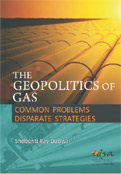The Sino-Japanese Rare Earths Row: Will China’s Loss be India’s Gain?
Following the dispute over the seizure of a Chinese trawler and its crew by Japan in the disputed waters in the East China Sea believed to be rich in oil and gas resources, Beijing has been flexing its muscles against Tokyo in another area. However, this one may have far deeper consequences not only for Japan but for the rest of the world.
- Shebonti Ray Dadwal |
- March 2011 |








